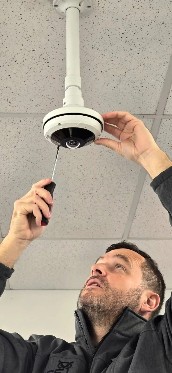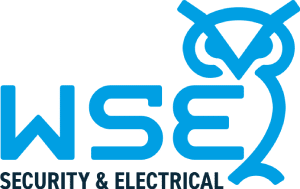CCTV Installation: DIY or Leave it to the Pros?
Keeping an eye on your home or business while you’re away is a top priority. One of the most popular ways to add some much-needed security is through CCTV installation. These little security systems allow you to keep an eye on your home or business while you’re away, deter would-be intruders, or provide valuable evidence in case the worst happens.
Many people investing in these systems wonder whether hiring a professional for CCTV installation help is worthwhile. With experience handling various electrical services in Wellington, we’ll discuss the pros and cons of hiring a professional or DIY-ing your system.
First, to fully understand the task ahead, let’s quickly review what a CCTV system is.
What is a CCTV System?
 CCTV stands for ‘Closed-Circuit Television’, a method used for video surveillance. A ‘closed’ circuit of video cameras is mounted in a specific location, with the current video and past data logs transmitted to a specific place. The keyword ‘closed’ indicates that this system is only accessible from certain monitors. If you install one of these systems, you can access a constant live video feed and stored data logs.
CCTV stands for ‘Closed-Circuit Television’, a method used for video surveillance. A ‘closed’ circuit of video cameras is mounted in a specific location, with the current video and past data logs transmitted to a specific place. The keyword ‘closed’ indicates that this system is only accessible from certain monitors. If you install one of these systems, you can access a constant live video feed and stored data logs.
Contrary to popular belief, CCTV is actually an umbrella term that can describe several different types of cameras. Before beginning an installation – whether you’re DIY-ing or hiring a professional – it’s important to be clear on which one is for you.
The three broad types of CCTV systems are:
- Digital video recording systems: These are wired cameras that use analog transmission (i.e., moving data along wires). They are usually the most cost-effective options and offer basic image quality, although you can access higher-quality models through a professional.
- Network video recording systems: These systems transmit data over a network, feature a high-resolution cameras, and connect via Local Area Network or LAN.
- IP cameras: These cameras are the simplest to install and generally only require electricity and an internet connection. Recordings are stored on a NVR platform, and all logs can be accessed via an online login. The quality of these cameras depends on your chosen vendor, and they are vulnerable to losing their internet connection.
The Process of CCTV Installation
CCTV installation is a complex process that requires some comfort with electrical work. To help you make your choice, let’s break down a simplified version of the installation process:
- Select your system: It is important to select the right type of system to meet your home or business’s circumstances. For example, if you live rurally or somewhere with an unstable network connection, an IP system would be a poor choice, as data could be lost.
- Map your locations: CCTV cameras must cover the right areas to capture crime or unwanted activity. Generally speaking, the best spots are around your building’s front, back, and side entrances. Any weak spots in your perimeter are also worth monitoring.
- Mount the cameras: Once you’ve chosen the locations, the next step is to mount the cameras to your building’s façade. Some models just require a simple screw-in job; for others, it is more difficult (depending on where your cameras are going). Since your cameras will face Wellington’s windy and rainy weather system, ensure you mount them securely.
- Run the wiring: This is the toughest part, which most DIYers struggle with, as it requires some electrical work. Whether or not you need to run wiring will depend on the type of CCTV system, but wired systems are always more reliable than wireless ones.
- Check the coverage: Finally, boot everything up and check that the system is working! This is an ideal time to check whether the cameras are covering the areas they need to be and make any adjustments as necessary.
As you can see, this can be a complex process. A confident DIYer can tackle this if they choose the right system, but many other home or business owners might prefer bringing a professional in for the job. In fact, let’s break down some of the pros and cons of DIY-ing your CCTV installation.
Pros and Cons of DIY-ing Your CCTV Installation
Pros
- In-Depth Understanding: Installing your own system requires plenty of research and hard work, which means you’ll have an in-depth understanding of how everything works in case of a failure or breakdown. However, this knowledge can also be gained through a professional installation, though not as hands-on.
- Learning Experience: Installing your own CCTV system can be a great learning experience for tech enthusiasts who love getting hands-on with new projects.
- Flexibility: When you handle your own installation, you run on your schedule, which can be useful if you have time to work out the kinks. In cases where you urgently need a system installed, it might be best to call a team that can get it done quickly.
- Cost-Effective (in some cases): By purchasing and installing a system yourself, there’s a chance you’ll save on labour costs. Ensure you’re confident in your skills, as having to repurchase your system or hiring a team on top of attempting the installation yourself can actually drive up costs.
Cons
- Technical challenges: This is a technically challenging installation; hiring a professional is the best bet if you want to get things done quickly.
- Time-consuming: Learning anything for the first time is time-consuming, and if you don’t have that time to spare, DIY-ing your installation might not be your best choice.
- Limited support: Working with a team for professional CCTV installation gives you access to experienced security experts who can recommend the best system, placement, and other installation considerations. Going it solo doesn’t offer that same support, both in the short and long term.
So, what’s the verdict?
It’s absolutely possible to DIY your installation if you’re confident using tools and taking on electrical work. However, for less experienced individuals, it pays to get professional CCTV installation help. Working with CCTV installation professionals gives you access to security assessments so they can define the best spots to install your cameras. It will ensure the system is installed properly and save you a lot of time, money, and stress.
Not to mention, you’ll be able to lean on a professional to help you make pivotal decisions that will define whether or not your system does what it’s intended to: keep you and your business safe.
Safeguard your property with Wellington Security & Electrical.
Find out what makes your home or business vulnerable to intruders with a free security assessment from Wellington’s security experts. Our team handles CCTV installations for Wellington homes and businesses, so our trained security experts are on hand to help at any time. Contact us to get started.

